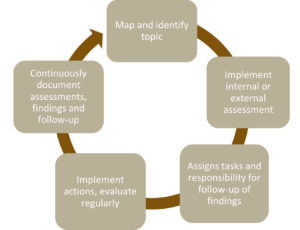Ethics, Transparency and Accountability
NIS implements a large range of projects together with donors and key national stakeholders to assist countries and communities to successfully emerge from conflict. In order to succeed with our activities and goals in these complex and volatile environments and contribute to stability, security and social cohesion, we need to work along high ethical standards and keep the processes as transparent as possible. We are accountable to our donors, partners, and our colleagues, but most of all we need to stay accountable to the institutions, communities and people we look to support and interact with.
This is why NIS has an extensive framework of policies, guidelines, strategies, and procedures in place to ensure our work does no harm to our surroundings, including the environment, the people, and the communities, and to meet the requirements of personnel management and secure a safe and health-promoting work environment for all.
Having the right documents in place however is not enough to actively uphold our policies and guidelines and react appropriately in response to a situation or breach of regulations. Both internal and external assessments take place continuously, typically after this model:



